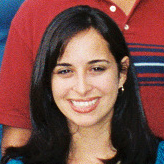Rachel is from St. Petersburg, Florida and graduated from Northwestern University with honors in 2003. She majored in Political Science, Sociology, and International Studies and studied European Union Studies in Paris, France. While serving as student body president of Northwestern, Rachel created the Eva Jefferson Civil Rights Program, the first campus-wide Thanksgiving Dinner, the first annual Community Action Fair, and the Alumni Speaker Series. She has spent summers interning at the Red Cross in the Disaster Services division, working at a Fortune 500 insurance company, and serving as a teacher and caretaker in an orphanage in Colón, Mexico.
Field placement: Los Angeles Regional Food Bank
Los Angeles, California
Policy placement: Prosperity Now
Washington, D.C.

